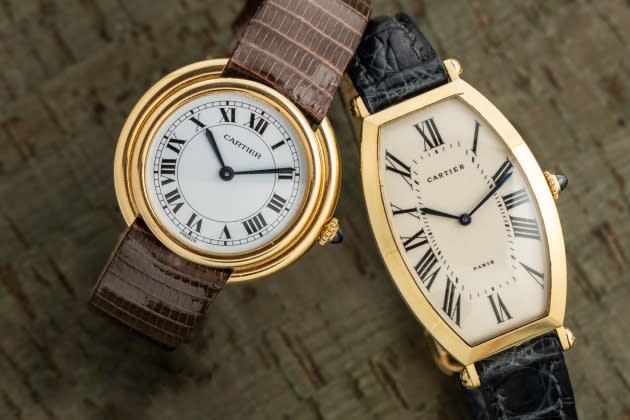Richemont Ditches PVC Plastic as Part of a Long Journey to Circularity

LONDON — P, V and C have become three of the most toxic letters in the English language, and Richemont has become the latest luxury name to eliminate them from its products and packaging, according to the group’s 2023 ESG report.
The letters stand for polyvinyl chloride, a type of plastic used for everything from pipes and windows to the coating on canvas handbags and high-end shopping bags. According to Greenpeace, PVC is the most environmentally damaging plastic because its production and disposal release chlorine-based chemicals into the environment.
More from WWD
Richemont, parent of brands including Chloé, Cartier, Van Cleef & Arpels, Panerai, Dunhill and Montblanc, confirmed that it ceased selling products, packaging and gifts that contain PVC in its own stores, and to wholesalers, as of December 2022.
In the meantime, the company said it has been exploring “more recyclable materials” to replace PVC and described the plastic’s phase-out as a “milestone” in efforts to become a greener company.
Richemont added that “very few viable recycling options exist today to responsibly manage PVC end of life, and it therefore often ends up in landfills. And when you think nearly 90 percent of all the plastic produced over the past six decades still exists today, it is important for each and every one of us to make positive changes where we can.”
The luxury group described its PVC phase-out initiative as “an important first step” of a global approach to minimize its use of plastics, “while progressively switching to better polymers with the goal of promoting circularity, and reducing environmental impact.”
Richemont confirmed last June that it was on track to eliminate PVC by the end of December 2022. Over the past few years, the group has been reporting its goals and accomplishments in increasing detail, and has also beefed up its ESG team.
The 2023 ESG report also detailed Richemont’s circularity initiatives, which range from products to shop fits and displays.
“Sustainability is a ubiquitous and complex topic that cannot be managed by a single team,” said Burkhart Grund, Richemont’s chief finance officer and a member of the board. “It takes all of us to move in the right direction to achieve impact. ESG is everybody’s business.”
The company noted that about 50 percent of its in-house repairs in the last year involved watches that were more than 15 years old.
It also pointed out that in 1996, Cartier created Cartier Tradition, which sells vintage Cartier designs that have been authenticated, documented and restored according to the information kept in the archives. Van Cleef & Arpels offers a similar service.
In its quest for circularity the company isn’t focusing solely on the glamorous bits of the business.
According to the report, the research and innovation team has established the Innovative Materials Showroom, an online and physical platform that offers materials that are suitable for use across the entire portfolio of brands.
Richemont said the platform showcases around a hundred innovative materials, such as alternative polymers to replace PVC, with 10 new additions being introduced every month.
The company also has an initiative called Bloomify, an internal platform designed to promote sustainability and circularity. It’s meant to provide a second life to items such as office fixtures, fittings and spare promotional materials from events such as Watches & Wonders, the annual trade event that showcases Richemont and other high-end watch brands.
Richemont said it was working on enhancing the platform to include the sale of second-hand IT equipment and looking to expand the offer beyond its Switzerland headquarters.
“This move will not only extend the life of valuable resources, but will also contribute to a more sustainable, circular economy within our organization and beyond,” Richemont said.
Best of WWD
